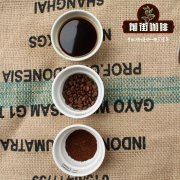How about Shirado Coffee? Brazilian Sheraton Coffee characteristics the flavor of Brazilian Syrador coffee

Professional coffee knowledge exchange more coffee bean information please follow the coffee workshop (Wechat official account cafe_style)
Central and South America is the largest coffee producing area in the world, and the amount of output here obviously affects the global price of raw coffee beans. Among them, Brazilian coffee is the country with the largest output in Central and South America, and it is also the largest country in coffee production. Brazilian coffee can account for more than 30% of the global output. As long as the production of Brazilian coffee increases, global coffee prices may fall sharply, which should not be underestimated!
However, coffee production in Brazil has actually stagnated, including reduced production due to Greenhouse Effect and natural disasters, reduced farmers' profits as a result of the decline in the US dollar, skyrocketing oil prices, switching to corn to increase bioenergy in coffee fields, and so on. but the most important reason is actually rising coffee consumption in Brazil, which is already the second largest coffee consumer after the United States!
Brazil in South America began to grow coffee in 1727. At that time, coffee seeds were smuggled by Francisco de Mello Palheta from the neighboring French colony (French Guiana) in northeastern Brazil. In 1845, Brazil accounted for 45% of global coffee production. So far, Brazil's total output is still the first in the world, accounting for about 1 of the world's total output.
In Brazil, coffee trees are planted at an altitude of 650 to 2600 feet. Major producing areas are concentrated in the central and southern provinces such as Minas Gerais, Sao Paulo and Parana. More than 300,000 farms are engaged in coffee cultivation, covering an area of no more than 10 hectares, most of which are harvested by machines and treated in the sun. About 80% of coffee is Arabica. 65% of coffee up to export grade is exported from the port of Santos (Santos).
Brazil-Syrador Coffee Brazil-Cerrado
Syracuse is a famous high-quality coffee producing area in Brazil. Its processing method is relatively fine. Unlike Brazilian Santos coffee, which is treated in the sun, Syrador coffee is mostly washed or semi-washed.
Premium Syrador coffee with nutty aromas, similar to Brazilian Santos but more delicate and clean. The aroma is moderate, the entrance feels soft and smooth, with a slight sweetness at the end.
It is produced in the prairie at an altitude of 850 to 1200 meters above sea level, with an average temperature of about 20 degrees throughout the year, and a distinct dry and wet season coupled with comfortable low temperatures to form a unique flavor of this bean. Cerrado Caf é Area is the best Brazilian bean in many producing areas of Brazil. It is made from raw beans by sun exposure.
Kenna Handmade Coffee uses beans that have passed through the Rainforest-Alliance Rainforest Conservation Alliance. The Rainforest-Alliance Rain Forest Conservation Alliance was founded in 1987 by Daniel R. Katz. The purpose of the Rain Forest Conservation Alliance is to protect nature and respect local people for enterprises in the world under affordable management requirements, and to produce goods in a way that does not destroy nature, and coffee beans or crops grown in such an environment will be organic standards. In order to protect the earth's environment.
Kenner's handmade coffee is the best choice for you to take into account public welfare, environmental protection, health and respect.
Important Notice :
前街咖啡 FrontStreet Coffee has moved to new addredd:
FrontStreet Coffee Address: 315,Donghua East Road,GuangZhou
Tel:020 38364473
- Prev

El Salvador Santa Elena Manor introduces how does El Salvador's washed bourbon coffee taste?
Professional coffee knowledge exchange more coffee bean information please follow the coffee workshop (Wechat official account cafe_style) El Salvador San Elena Manor El Salvador Finca Santa Elena in Central America, El Salvador can be said to be the smallest country, although the output is much less than other countries, but the Pacific sea breeze and fire
- Next

Jamaica Blue Mountain Coffee Flavor Taste Description Where is Blue Mountain Coffee grown
Professional coffee knowledge exchange More coffee bean information Please pay attention to coffee workshop (Weixin Official Accounts cafe_style) You may not be familiar with where Jamaica is, but you must have heard of the famous Blue Mountain Coffee. What is so special about Blue Mountain Coffee? Let's take a trip to Jamaica and explore the aristocratic origins of Blue Mountain Coffee. Jamaica, yes
Related
- Detailed explanation of Jadeite planting Land in Panamanian Jadeite Manor introduction to the grading system of Jadeite competitive bidding, Red bid, Green bid and Rose Summer
- Story of Coffee planting in Brenka region of Costa Rica Stonehenge Manor anaerobic heavy honey treatment of flavor mouth
- What's on the barrel of Blue Mountain Coffee beans?
- Can American coffee also pull flowers? How to use hot American style to pull out a good-looking pattern?
- Can you make a cold extract with coffee beans? What is the right proportion for cold-extracted coffee formula?
- Indonesian PWN Gold Mandrine Coffee Origin Features Flavor How to Chong? Mandolin coffee is American.
- A brief introduction to the flavor characteristics of Brazilian yellow bourbon coffee beans
- What is the effect of different water quality on the flavor of cold-extracted coffee? What kind of water is best for brewing coffee?
- Why do you think of Rose Summer whenever you mention Panamanian coffee?
- Introduction to the characteristics of authentic blue mountain coffee bean producing areas? What is the CIB Coffee Authority in Jamaica?

